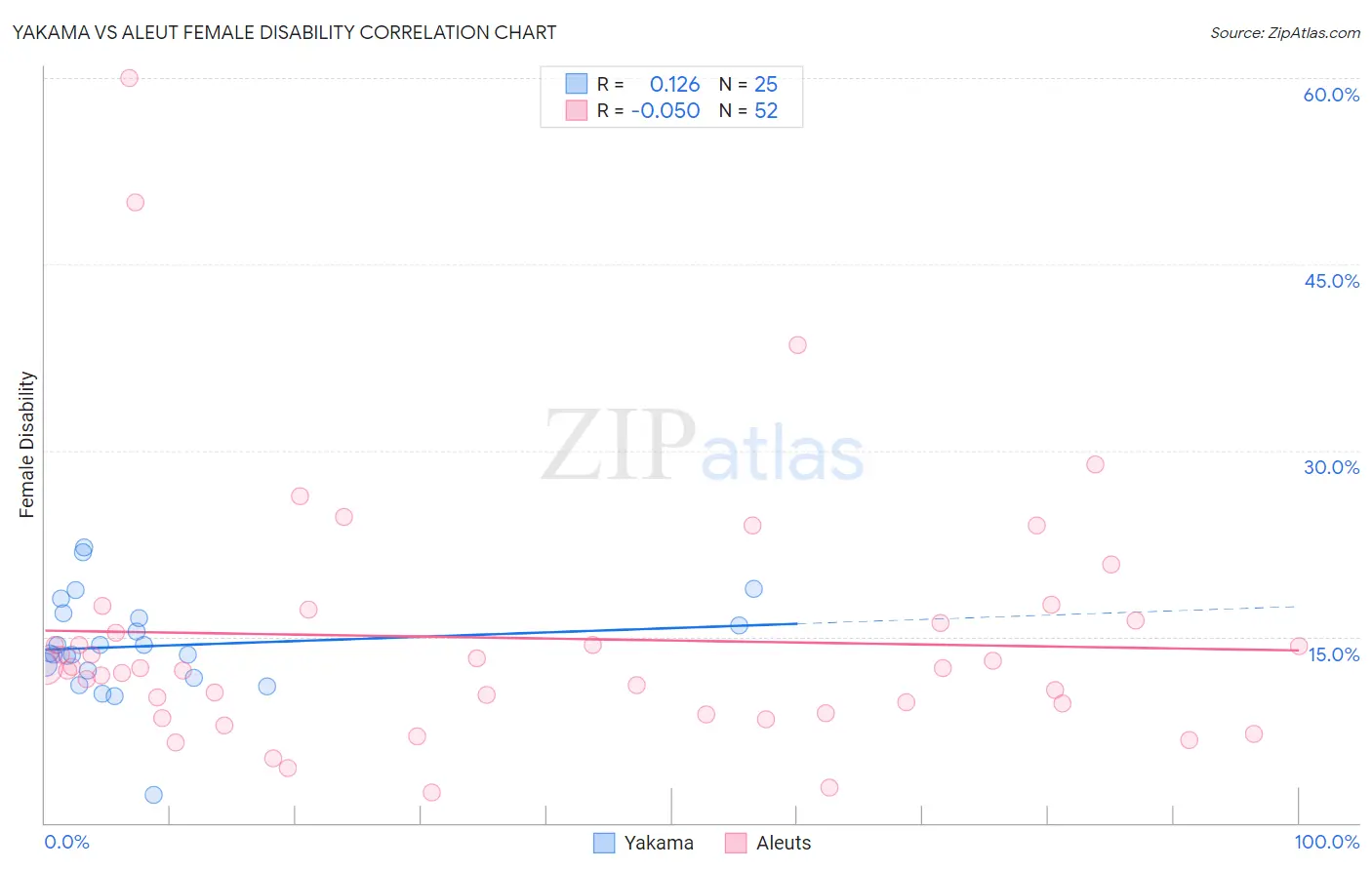Yakama vs Aleut Female Disability
COMPARE
Yakama
Aleut
Female Disability
Female Disability Comparison
Yakama
Aleuts
13.2%
FEMALE DISABILITY
0.0/ 100
METRIC RATING
292nd/ 347
METRIC RANK
12.7%
FEMALE DISABILITY
1.1/ 100
METRIC RATING
258th/ 347
METRIC RANK
Yakama vs Aleut Female Disability Correlation Chart
The statistical analysis conducted on geographies consisting of 19,917,587 people shows a poor positive correlation between the proportion of Yakama and percentage of females with a disability in the United States with a correlation coefficient (R) of 0.126 and weighted average of 13.2%. Similarly, the statistical analysis conducted on geographies consisting of 61,781,040 people shows no correlation between the proportion of Aleuts and percentage of females with a disability in the United States with a correlation coefficient (R) of -0.050 and weighted average of 12.7%, a difference of 4.2%.

Female Disability Correlation Summary
| Measurement | Yakama | Aleut |
| Minimum | 2.3% | 2.5% |
| Maximum | 22.2% | 60.0% |
| Range | 19.9% | 57.5% |
| Mean | 14.3% | 14.9% |
| Median | 13.6% | 12.5% |
| Interquartile 25% (IQ1) | 12.0% | 9.2% |
| Interquartile 75% (IQ3) | 16.7% | 16.2% |
| Interquartile Range (IQR) | 4.7% | 7.0% |
| Standard Deviation (Sample) | 4.1% | 10.5% |
| Standard Deviation (Population) | 4.0% | 10.4% |
Similar Demographics by Female Disability
Demographics Similar to Yakama by Female Disability
In terms of female disability, the demographic groups most similar to Yakama are Shoshone (13.2%, a difference of 0.17%), Tlingit-Haida (13.2%, a difference of 0.23%), Immigrants from Yemen (13.2%, a difference of 0.23%), Marshallese (13.3%, a difference of 0.26%), and Celtic (13.3%, a difference of 0.31%).
| Demographics | Rating | Rank | Female Disability |
| Bangladeshis | 0.0 /100 | #285 | Tragic 13.1% |
| Fijians | 0.0 /100 | #286 | Tragic 13.1% |
| Yaqui | 0.0 /100 | #287 | Tragic 13.2% |
| Whites/Caucasians | 0.0 /100 | #288 | Tragic 13.2% |
| Tlingit-Haida | 0.0 /100 | #289 | Tragic 13.2% |
| Immigrants | Yemen | 0.0 /100 | #290 | Tragic 13.2% |
| Shoshone | 0.0 /100 | #291 | Tragic 13.2% |
| Yakama | 0.0 /100 | #292 | Tragic 13.2% |
| Marshallese | 0.0 /100 | #293 | Tragic 13.3% |
| Celtics | 0.0 /100 | #294 | Tragic 13.3% |
| French | 0.0 /100 | #295 | Tragic 13.3% |
| Nepalese | 0.0 /100 | #296 | Tragic 13.3% |
| Slovaks | 0.0 /100 | #297 | Tragic 13.3% |
| Immigrants | Nonimmigrants | 0.0 /100 | #298 | Tragic 13.4% |
| Immigrants | Dominican Republic | 0.0 /100 | #299 | Tragic 13.4% |
Demographics Similar to Aleuts by Female Disability
In terms of female disability, the demographic groups most similar to Aleuts are Liberian (12.7%, a difference of 0.0%), British West Indian (12.7%, a difference of 0.030%), Immigrants from Armenia (12.7%, a difference of 0.080%), Subsaharan African (12.7%, a difference of 0.090%), and Immigrants from Germany (12.7%, a difference of 0.10%).
| Demographics | Rating | Rank | Female Disability |
| Crow | 1.6 /100 | #251 | Tragic 12.7% |
| Immigrants | Caribbean | 1.4 /100 | #252 | Tragic 12.7% |
| Jamaicans | 1.4 /100 | #253 | Tragic 12.7% |
| Hawaiians | 1.4 /100 | #254 | Tragic 12.7% |
| Immigrants | Germany | 1.3 /100 | #255 | Tragic 12.7% |
| British West Indians | 1.2 /100 | #256 | Tragic 12.7% |
| Liberians | 1.1 /100 | #257 | Tragic 12.7% |
| Aleuts | 1.1 /100 | #258 | Tragic 12.7% |
| Immigrants | Armenia | 1.0 /100 | #259 | Tragic 12.7% |
| Sub-Saharan Africans | 1.0 /100 | #260 | Tragic 12.7% |
| Bermudans | 1.0 /100 | #261 | Tragic 12.7% |
| Czechoslovakians | 0.9 /100 | #262 | Tragic 12.7% |
| Spaniards | 0.7 /100 | #263 | Tragic 12.8% |
| Alaska Natives | 0.6 /100 | #264 | Tragic 12.8% |
| West Indians | 0.5 /100 | #265 | Tragic 12.8% |